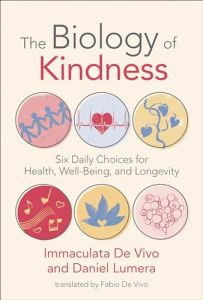Únase a getAbstract para acceder al resumen.

Únase a getAbstract para acceder al resumen.
Immaculata De Vivo and Daniel Lumera
The Biology of Kindness
Six Daily Choices for Health, Well-Being, and Longevity
MIT Press, 2024
¿De qué se trata?
Learn why kindness is a powerful medicine, and the key to longevity, resilience and healing from trauma.
Recommendation
Don’t underestimate the power of kindness; it may just be the secret to health. Embracing emotions associated with kindness, such as gratitude and optimism, can positively influence your health in wide-ranging ways, including extending longevity and recovering from heart failure. Drawing on a wealth of sources, from positive psychology research to Vedic philosophy, epidemiologist Immaculata De Vivo and biologist Daniel Lumera argue in favor of integrating acts of kindness into both health care systems and everyday life, thus helping people self-actualize and build resilience.
Summary
About the Authors
Immaculata De Vivo is a Harvard professor of both epidemiology and medicine whose research explores carcinogenesis and disease prevention. Daniel Lumera is a biologist and the best-selling author of The Cure of Forgiveness. He’s the creator of the My Life Design® method, which helps people consciously design their professional, social and personal lives.


















Comment on this summary